Have you found your first gray hair yet? A recent inspection of my roots (to determine how long I could put off a highlighting appointment) found a whole crop of them. My head had been invaded!
It was an aging slap in the face. Because, of course, I then went on a wrinkle hunt, and the evidence of my denial mounted.
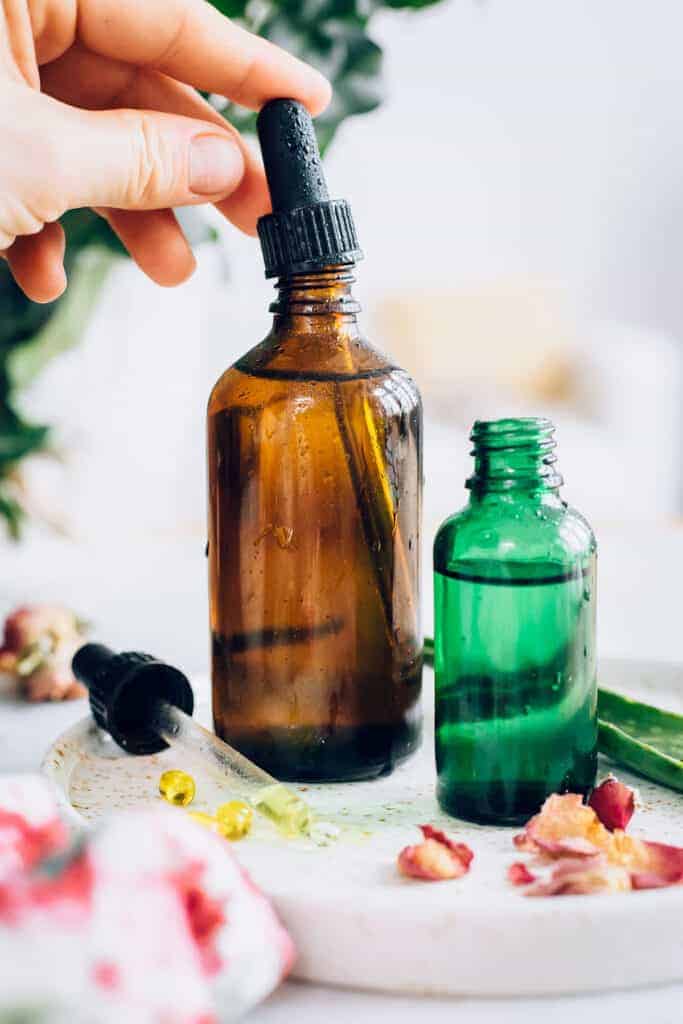
Let the anti-aging research begin! I've discovered how good natural fruit acids are for reducing age spots [source] and how older skin needs tons of moisture. Where did the oily days go? Now my face always feels like a poor man dying in the desert.
I've even changed my mind about face misters. Aren't people who spritz their faces on planes completely self-absorbed nuts? No! Giving your skin moisture throughout the day is definitely an excellent anti-aging idea.
Searching for an age-defying topical treatment that provides optimum hydration with minimal skin irritation is essential.
Hydrating Face Serum
That's where this homemade serum comes in. It's a light moisturizer that hydrates with only a small amount of oil—your face feels soft and pampered but not greasy. Aloe hydrates and heals skin (though natural versions must be refrigerated) and is rich in vitamins A, C, and E [source].
These vitamins and other natural compounds in aloe vera function as antioxidants and anti-inflammatories that help protect the skin from damage imposed from outside stressors [source]. Aloe vera further helps to moisturize the skin, protecting the impaired skin barrier.
It has been shown to reduce wrinkles by stimulating collagen production [source]. Glycerin functions as a natural humectant, which means that it draws in moisture from the air to work as an effective moisturizer [source].
Hydrating Serum Ingredients
- ¼ cup aloe vera gel
- 2 tablespoons vegetable glycerin
- 1 teaspoon jojoba oil
- 1 vitamin E capsule (optional)
- 2–4 drops of essential oil like lavender, chamomile, or rose
Combine ingredients in a small glass pump bottle and shake well to combine. Apply to clean skin at night for a light, overnight moisturizer. Shake before each use if including the vitamin E capsule. This will last indefinitely if stored in the refrigerator.
Why jojoba oil?
Jojoba and avocado oil (see below) are two of my favorites for skincare recipes. Jojoba is an oil that's very close to our skin's natural oil, and you can use it for just about anything (much like coconut oil).
It's noncomedogenic, meaning it won't block pores, and in fact, it helps oily skin level out oil production. Plus, it's loaded with vitamin E, linoleic acid, and antioxidants that regenerate skin cells [source].
But if you don't have any jojoba on hand, you can totally make this recipe without it, and it will still be excellent for your skin.
Anti-Wrinkle Eye Serum
Now for the eyes! You can definitely use a heavier (read: oilier) combination here as the tissue around your eyes is very thin and obviously more prone to wrinkles.
Why avocado oil?
Avocado oil is perfect for your eyes because its abundant fatty acids help balance skin's moisture levels, and the high levels of vitamins A, C, and E rejuvenate dry skin and remove those pesky free radicals that age skin. Rich in fatty acids, avocado oil is excellent for skin hydration [source].
After you apply the facial serum at night, tap a tiny amount of eye cream around the crease of your eye. A little goes a long way—if you go overboard slathering it on, you'll get it in your eyes and it will sting a bit (yep, learned this the hard way!).
Anti-wrinkle eye serum
- 2 tablespoons avocado oil
- 2 tablespoons fractionated coconut oil
- ⅛–¼ cup aloe vera
- 1 vitamin E capsule (optional)
Combine ingredients in a dark glass bottle, preferably one with a dropper. Shake well to combine. Put 3–5 drops onto your finger, and pat into the skin around your eyes before bed. If you add the vitamin E capsule, you'll need to shake before each use.
Note: you can add a couple of tablespoons of cocoa butter to the recipe if you prefer a more solid cream. Cocoa butter is another major moisturizer and can make it easier to apply (it won't slide around as much).
DIY Serum FAQ
Do I need to store my serums in a dark amber bottle?
I recommend dark bottles as a way of keeping your oils fresh. But if you store your serum in the refrigerator, you don't necessarily need to use an amber bottle. In that case, a clear bottle should be just fine.
Can I add a preservative to make my eye serum last longer?
Sure. I like this one.
Do I have to store this in the refrigerator? What if I use a preservative?
If you use fresh aloe, then you'll need to keep your serum in the refrigerator unless you use a preservative.
If you use a full-spectrum antimicrobial preservative (see link above), your homemade products should be fine stored at room temperature.
Can I leave out the aloe vera entirely?
Sure! But you might need to adjust the other ingredients until you find a consistency you like.
Do I have to use the vegetable glycerin?
No, you don't have to. But I find that the glycerin adds moisture without feeling greasy like oil-based serums often do.
DIY Hydrating Face Serum + Anti-Wrinkle Eye Oil
Equipment
- Small bowl
- Glass dropper bottle
Materials
Hydrating Face Serum
- ¼ cup aloe vera gel
- 2 tablespoons vegetable glycerin
- 1 teaspoon jojoba oil
- 1 vitamin E capsule optional
- 2–4 drops of essential oil like lavender, chamomile, or rose
Anti-Wrinkle Eye Serum
- 2 tablespoons avocado oil
- 2 tablespoons fractionated coconut oil
- ⅛ – ¼ cup aloe vera
- 1 vitamin E capsule optional
Instructions
Hydrating Face Serum
- Combine ingredients in a small glass pump bottle, and shake well to combine. Apply to your clean skin at night for a light, overnight moisturizer. Shake before each use if using the vitamin E capsule. Will last indefinitely if stored in the refrigerator.
Anti-Wrinkle Eye Serum
- Melt the coconut oil, if needed, and combine ingredients in a dark glass bottle, preferably one with a dropper. Shake well to combine. Put 3–5 drops onto your finger and pat into the skin around your eyes before bed. If you add the vitamin E capsule, you’ll need to shake before each use
Notes
This post was medically reviewed by Dr. Rina Mary Allawh, M.D., a dermatologist who practices adult and pediatric medical dermatology, skin cancer treatment, and cosmetic dermatology. Learn more about Hello Glow's medical reviewers here. As always, this is not personal medical advice, and we recommend that you talk with your doctor.
Photos by Ana Stanciu
607
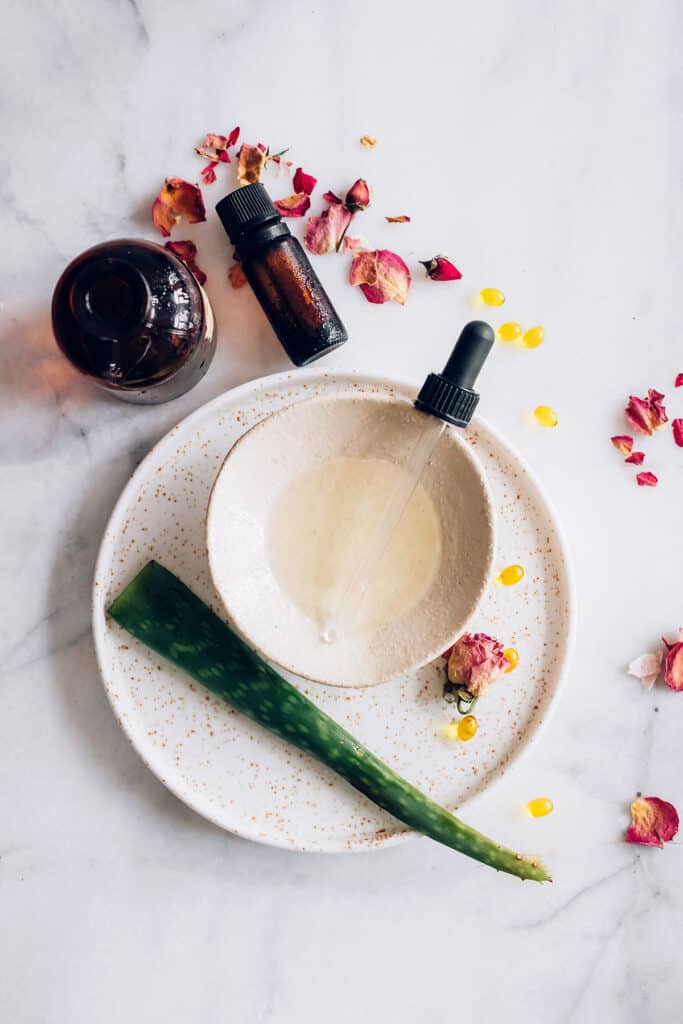
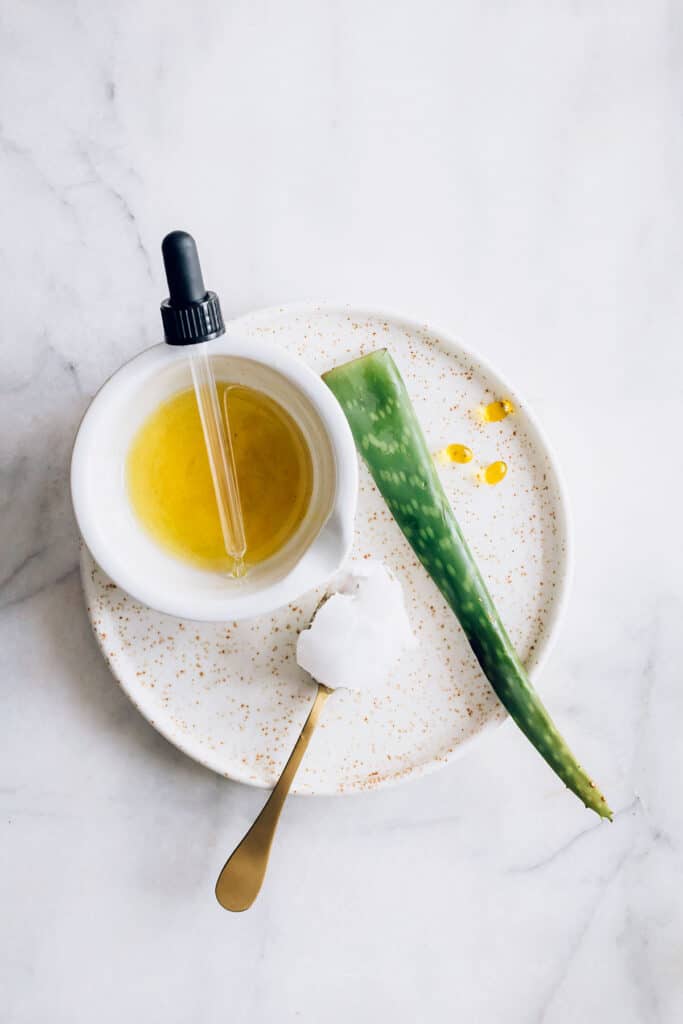
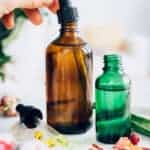
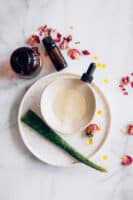
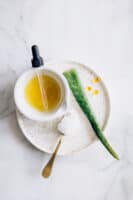
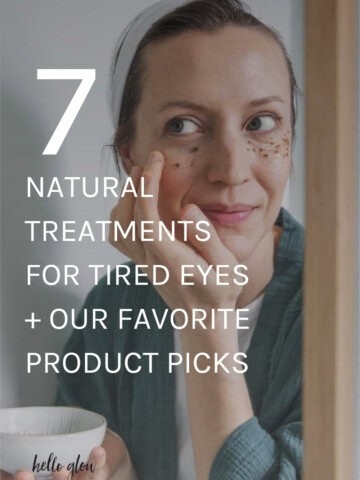
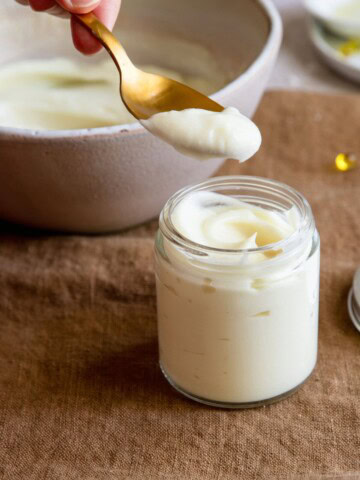
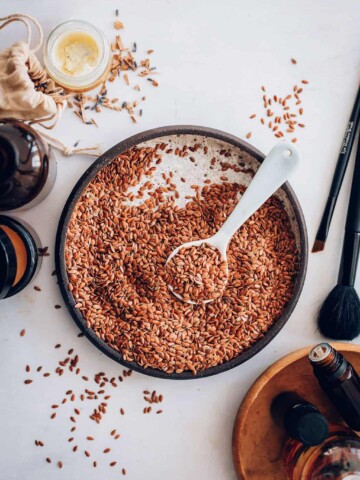
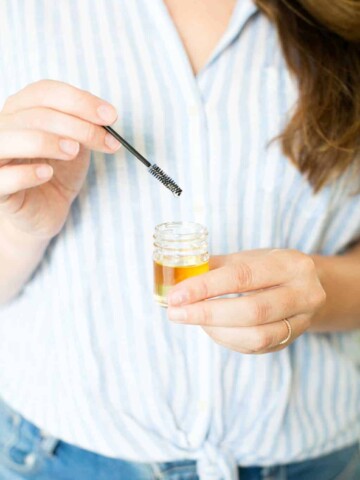
Linda Camp says
I found something from the kitchen that does WONDERS, no only for my skin, but for my eyes as well. I used to have really bad dry eye, but I started using avocado oil directly into my eyes and that was the end of dry eyes for me. It also does wonders for my skin. Great stuff!
Chrissie says
Seen some really good questions her, sadly don’t see answers to them all. I wonder why?
Neli says
I think you mean "fractionated" coconut oil, not fractioned. Can't wait to try some of your recipes.
paulette says
I buy all my beauty products on Amazon, and I have tried almost all the firming serums. The best one I found (and I am sticking with) is the Made from Earth Vitamin Firming Serum.
I started using this serum because it is approved by "Good Housekeeping" and it is reasonably priced. They do not automatically keep sending you products like so many companies do online. When you put the serum on, it does feel like it tightens your skin right away. It is helping my skin on my face, throat and chest.
Savita shirwale says
Hi, I want make my own face syrum with some oils like coconut oil, avocado oil, almond oil, vitamin e oil, rosehip seed oil, castor oil, olive oil. How much amount should I take of each oil. And even I am thinking that I have to add some rose water and alovera gel. My age is 42. My face become very dull and dry. I don't use any Moisturizer or cream. Pl suggest me.
Ailsa Early says
Hi, looking forward to trying this! Can I use vitamin e oil instead of a capsule? How much would I use?
Thank you!
Terry says
Can you add a preservative?
Carson Barenborg says
Hey question - If I am adding the aloe vera gel can I store it with the oils in a warm dark place in an amber glass? Or will it not last? I'm using Leucidal, an organic natural preservative so I'm hoping that it will help keep the aloe vera and glycerin fresh not being in the fridge. The reason why I don't want to place them in my fridge is that carrier oils and essential oils are best at room temperature and I don't want them to go weird. Please let me know if you can answer my question!! It's urgent I have a project due in my esthetician course.
Pat says
As I've mentioned before, I like to glow. However, I do not like to be shiny. I also find that my somewhat-dry skin, gets a 'lil greasier during the summer, which is to be expected. Right now, the ONLY THING I will use in the summer is the Lady Soma Renewal Serum - It's keeping my skin conditioned, fresh, and not too shiny, no matter the heat!!!
LuLuLun Mask says
Hi there, the whole thing is going perfectly here and
ofcourse every one is sharing information, that's really excellent, keep up writing.
Selina says
I use plain rosehip oil for around my eyes but I might give this one a go as well
Rhonda says
Thanks for the great recipe I can't wait to try!! I have been using natural homemade beauty products for some time now, but I am new and curious to the benefits of facial serums, so this is very helpful to me :-) I also have a great tip for all of you!! Honey!!! Raw organic honey (not the kind in the plastic bear shaped bottle) wash your face with it and it moisturizes and kills bacteria and fungus, its so beneficial to skin, and also a great gentle exfoliant too!! Just make sure it is raw and organic!! The processed junk in the plastic bear has no benefits for your skin because all the skin loving qualities have been processed right out if it :) hope you all love this as much as I do! Good luck!
iris says
hi, i just tried this and i love it! But just wonder is it necessary to keep the serum in fridge??
vivian says
wowww girls i bought the best body lotion & cream face everrrr by mamilan.com !!! best pricess
Annie says
Hi thank you for sharing the recipe.
I have everything in hand but my aloe Vera gel expired.
Haven't had a chance to get a new one as yet.
Is it necessary to include?
Please advise.
Thank you
:)
Andréane says
Great recipes! How do you store them and how long should you keep them? Thanks!
gerbermom says
The face serum needs to be refrigerated due to the aloe, and it will keep for several months.
Lillie says
Thank you so much! I def,will try this. i need help bad.I hope I will remember write back. Have a blessing day!!
anti aging products says
Greatest VITAMIN C AVAILABLE: Our powerful 20% Vitamin C + Hyaluronic Acid + Vitamin E is gentle, nevertheless simple and highly effective. We use solely the best, plant-based ingredients available, without parabens, zero alcohol, without the need of animal experimentation. Made in the States.VITAMIN C WORKS! Vitamin C recommended by a renowned health professional on Television for a reason. He called it as his #1 anti aging secret that can help drop a decade from your skin. He clearly explained that topical vitamin C is twenty times more powerful compared with taking it orally to replenish your skin's vitamin C levels that naturally decline with time. He additionally added that integrating vitamins C together with E together gives a "super potent anti aging punch
Jamie Omahen says
This will be a great help to my skin and wallet this summer! Thank you for sharing your recipes!
Cathy Schmidt says
Thank God I found you again!!! I didn't pin it when I came across it first time and since then I've acquired the ingred. and no instructions. Thank you.so much. I too, am getting "older" and hope it's not too late to get some results (good, or better)! It just "snuck " up on me and this "older" gal can't stand the lines! So thank you again!
Sheila Holman says
Does the glycerin have to be vegetable or can regular glycerin be used?
Lindsey Johnson says
You could probably use regular glycerin...not sure there would be much of a difference. We prefer to use the vegetable non-GMO, but that's just personal preference. You could use either.
Terry says
Where in Eastern Pennsylvania does one obtain these ingredients? I have no idea where to begin but I would like to use natural ingredients on my face now that I am getting up there in age (65) and I'm lost. Your help would be greatly appreciated. Thank you.
Terry M.
Lindsey Johnson says
Hey Terry! I would look online maybe someplace like vitacost.com or iherb.com. I think these ingredients are available that way. If you have a health food or a Whole Foods near you, that is another option.
Nikute says
Been using almond oil [under my eyes ]and jojoba oil alone on my face for a while, love the results but think i'll give this a try. Especially the eye oil.
dana says
TOTALLY making these. I have everything on hand except the vegetable glycerin. Is it necessary?
Lindsey Johnson says
Dana, the glycerin is important because it is very moisturizing. I don't know else you could substitute with the same effects. I get mine from Whole Foods. It's about $8 for a giant bottle.
gerbermom says
I know, this was the first time I had used glycerin too but I love it. The aloe by itself is nice but adding the glycerin definitely adds moisture without a lot of oil.